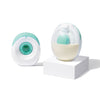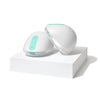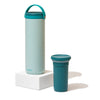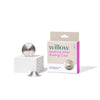Welcome to the wonderful world of parenting! A journey that’s full of surprises, but it can also be challenging, especially if you're a first-time parent. One of the feeding challenges new parents often face is cluster feeding.
First of all, let's take a moment to acknowledge that cluster feeding is ROUGH. It can feel like your baby is always hungry, and you're nursing or feeding them 24/7.
Oh! And cluster feeding is not just for breastfed babies - any baby can, and most likely will, experience cluster feeding.
It's exhausting, and it can leave you feeling drained, both physically and emotionally. So, if you're in the thick of it right now, take a deep breath and remind yourself that it's normal, and it will pass.
What is Cluster Feeding?
Cluster feeding is when your baby wants to nurse frequently in a short period, often back to back, for hours at a time. If you’re nursing, it will probably feel like your baby is attached to your breast non-stop during these periods. Cluster feeding can happen at any time of day or night, and you'll probably feel exhausted and overwhelmed.
Why Do Babies Cluster Feed?
Cluster feeding can be a stressful experience for new parents, but it’s important to understand why it happens. One reason babies cluster feed is because of growth spurts. During a growth spurt, babies need to eat more often to support their developing bodies. This can happen around certain stages of life and when they hit specific milestones, such as two weeks, six weeks, and three months of age. Of course, though, every baby is different.
Similar to a growth spurt, babies may cluster feed simply because they have a higher demand for milk. This could be due to an increase in physical activity, a change in routine, or even a change in the weather.
Babies also cluster feed for comfort. Nursing provides a sense of security for babies, and cluster feeding can be a way for them to feel more connected to you.
Whatever the reason, it’s important to remember that cluster feeding is a normal part of a baby's development.
When Do Babies Typically Cluster Feed?
Cluster feeding can happen at any time, day or night.
However, there are certain time periods in a baby’s life when it’s more common. For example, growth spurts are a common time for babies to cluster feed, as mentioned earlier. Other times may include when babies are going through a developmental leap or experiencing a change in routine.
Cluster feeding can last for a few days at a time, and it can feel like forever when you’re in the middle of it. But don’t worry, it will end! The best thing you can do is try to stay calm and patient while your baby gets the nourishment and comfort they need.
How Do I Know if My Baby is Cluster Feeding?
It can be hard to tell if your baby is cluster feeding, especially if you’re a new mom. However, there are a few signs to look out for:
-
Your baby may want to nurse more frequently than usual, and they may not seem satisfied after a feeding. They may also have shorter feeding sessions, but want to nurse again soon after.
-
Fussiness. Your baby may seem more irritable than usual, and may have a harder time settling down for naps or bedtime. It’s important to pay attention to your baby’s cues and respond to their needs as best you can.
How Can I Prepare Myself for Cluster Feeding?
While you can’t always predict when your baby will cluster feed, there are a few things you can do to prepare yourself. First, try to get your baby on a consistent feeding schedule before cluster feeding starts. This can help you anticipate when your baby will need to eat, and can help you prepare for longer nursing sessions.
Second, it’s important to have a support system in place. Cluster feeding can be emotionally draining, so having someone to talk to or help with household tasks can make a big difference. Don’t be afraid to ask for help!
Third, remember to stay hydrated and well-nourished. Breastfeeding can be dehydrating, so make sure to drink plenty of water and keep healthy snacks within reach. Finally, take care of your nipples. Nursing for long periods of time can be tough on your nipples; it can range from discomfort to downright painful, so consider using a nipple balm like Willow’s Mama Care Nipple Balm, which is specially formulated to soothe and protect sore nipples.
Mama Care Bundle
Mama Care Bundle
For a body that's done so much. The Willow Mama Care bundles includes our clean, ultra-moisturizing nipple balm to heal and sooth cracked nipples and luxurious, quick-drying breast and belly oil.
Breastfeeding Is HARD Work - Let Willow Help You Every Step of the Way
While cluster feeding is normal and expected, it can still be emotionally draining for new moms. You may feel like you're constantly feeding your baby and not getting anything else done. This is where having a support system is crucial. Lean on your partner, family, or friends to help with chores, meals, or even holding the baby for a few minutes so you can take a shower or nap. Don't be afraid to ask for help and accept it when it's offered.
In addition to physical and emotional preparation, there are also products that can help make cluster feeding easier. The Willow Go and Willow 3.0 can make pumping a breeze, so it’s one less thing you have to stress about.
Remember to stay hydrated, fueled, and comfortable, and don't hesitate to reach out for help when you need it. You've got this!


















